2022 International Day of Women and Girls in Science
11 February 2022
This International Day of Women and Girls in Science, we're showcasing four members of our fantastic community.
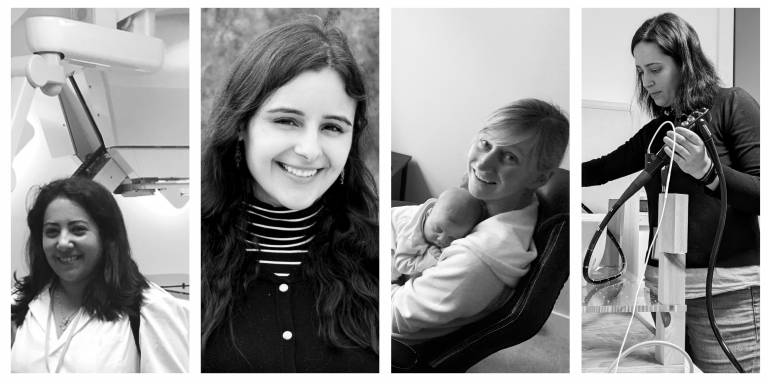
Photo L-R: Dr Reem Ahmad, Dr Sana Hannan, Dr Esther Bär and Dr Ester Bonmati Coll
We asked four women from our research community what inspired them to choose their field, what are the biggest challenges facing women pursuing a career in science and what advice they would give to girls thinking about getting into STEM.
- Dr Reem Ahmad, Research Fellow in Radiation Oncology
- What is your role and describe what a typical day at work looks like?
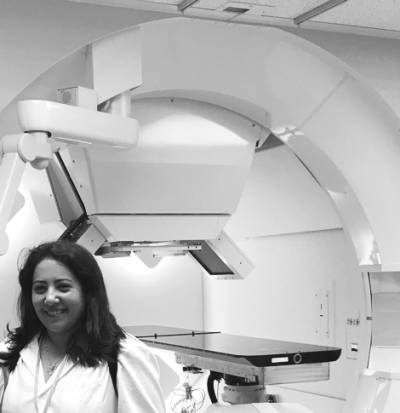
I am a research scientist, working within a team investigating healthy and cancerous tissue responses to different types of radiation treatments. In terms of a typical day at work, it really depends on the day! My work is both computational and experimental so it can be quite varied.
What makes you excited about your job?
The fact that each day can be so different. I like the challenges that this variation brings, as it means that my work is constantly evolving. It is also nice to be in a work environment where I can adapt what I am doing to include relevant, new and exciting things that interest me.
What inspired you to work in this field?
I always wanted to work in a field that could help people, but did not necessarily want to go down the medicine route. I always enjoyed maths and physics and luckily, the further I progressed through my education, the more I became aware that I could use my passion and skillset in medical research in the form of medical physics. That was always the pull for me, knowing that I could do what I loved and that even if I only made a tiny contribution, it may someday make a huge difference and really help people.
What do you think is the biggest challenge for women in science?
I think women unfortunately have a tendency to second guess themselves. Therefore, working in a job where you do not necessarily know what the correct answer is can be quite a challenge. I do see this changing though. Speaking from personal experience, when I first started as a PhD student I would constantly doubt my abilities, but over time I became better at trusting myself and thankfully I feel like less of an imposter now.
What has been the highlight of your career so far?
Hearing that people have actually read the work that I have published. I was once having a conversation with a colleague about work I did during my PhD. She seemed very interested as she had to present a paper on this topic for a journal club during her masters degree. As she described this paper we both realised that the paper she had presented was on my work (also the first paper I had ever published!)
What is the best piece of advice that you have received that has helped you in your career?
I was once told that making mistakes is part of the journey in research. I think hearing this was very reassuring for me. When I first started my research career I was always worried that I would do things incorrectly. However, I found that it was a normal part of research and that I would simply learn from these mistakes and become a better researcher.
What advice would you give to young girls thinking about going into science?
If you are even slightly curious about studying or working in science then my advice would be to really explore the different avenues available. Go to university open days, go to taster courses to get a feel for what it is like, talk or email relevant people and see if you can shadow them to determine ‘Is this the job I think it is?’.
You have nothing to lose by doing all of this, it just helps you get an idea of what this career will be like. Science related work covers such a huge variety of courses and jobs. It is hard to know what will suit you best, unless you do a bit of exploring. One thing I have learnt working in this field is that it is never quite what you expect. That is not meant to put anyone off pursuing this career, on the contrary, it is to highlight that by digging a bit deeper you will probably find that you have a lot of misconceptions of what this job will be like and what your capabilities are. I know when I first started, I really didn’t know how to get to where I wanted to be. I wanted to help people and make some kind of difference to the world. At each stage I was a bit unsure and hesitant, but I tried to talk to as many people as I could and get work experience in a variety of science related jobs to see what would be the best fit for me. Luckily, I found that research worked for me. It allowed me to mould my work into whatever I was interested in and gave me the opportunity to constantly gain new skills.
- Dr Sana Hannan, UCL Alumni, PhD in Neuroscience
- What is your role and describe what a typical day at work looks like?
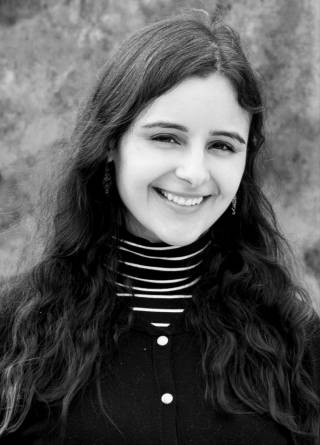
In my current role as a Postdoctoral Fellow at the Montreal Neurological Institute-Hospital (The Neuro), I undertake clinical research to investigate how sleep impacts epileptic activity in patients with drug-resistant epilepsy who are undergoing presurgical monitoring. This research involves using techniques such as intracranial electroencephalography (EEG) and polysomnography (sleep) recordings to analyse brain activity with high resolution. A typical day at work can involve any of a range of tasks including patient recruitment, setting up for and conducting clinical studies, data analysis using various methodological approaches, presenting my research findings at lab meetings and departmental seminars, supervising graduate students, and preparing to submit my work to present at international conferences and publish in peer-reviewed journals.
What makes you excited about your job?
The thing that I enjoy most about my job is being able to interact directly with patients at our hospital. Learning about their experiences of living with such debilitating disorders is a constant reminder of why the research we are working on is so important. It is a privilege to be based at The Neuro, one of the largest training centres for brain research in the world, and to be surrounded by world-leading experts in the field of neurology. Seeing how our centre’s research is directly benefiting the patient population and improving the quality of life of these individuals is incredibly rewarding. Another of my favourite aspects of this work is having the opportunity to travel to international conferences to share my research with the wider scientific community, engage in discussions and exchange ideas towards overcoming challenges and guiding future directions to advance the field.
What inspired you to work in this field?
I have been fascinated by the inner workings of the human brain from a young age. My interest in neuroscience research stems from the many unanswered questions about how the brain functions in health and what goes wrong in disease. During my undergraduate degree, I undertook a summer research internship where I worked towards understanding the underlying mechanisms of temporal lobe epilepsy. Here, I developed a passion for epilepsy research and was inspired to continue to work on improving the diagnostic and therapeutic prospects for this highly prevalent and disabling disorder. My PhD at UCL and subsequent postdoctoral training has enabled me to do this.
What do you think is the biggest challenge for women in science?
There are many challenges that women face in science. One of the most common, particularly in male-dominated environments, is workplace discrimination. Many women feel the need to prove themselves in order to earn the respect of their colleagues and supervisors. It is not uncommon in academia for ideas to be casually dismissed when suggested by women and later taken more seriously when suggested by their male counterparts. As well as being demoralising, this can exacerbate other issues relating to the obstacles faced by women in science, such as low self-confidence. Promoting welcoming, supportive and inclusive work environments is key to addressing such gender bias and discrimination.
What has been the highlight of your career so far?
The highlight of my career so far was giving a talk at the Society for Neuroscience’s Annual Meeting in 2019. This is the largest neuroscience conference in the world (~30,000 attendees) and it was an honour to have this unparalleled opportunity to present the key findings from my PhD to numerous world-renowned experts in the field. During this conference, I enjoyed answering questions and receiving feedback on my research, learning about other studies around the world and forming collaborations.
What is the best piece of advice that you have received that has helped you in your career?
The most important career advice that I have received is simply to not give up. Scientific research requires patience and you can spend days, weeks or even months just developing a method needed for your experiments. Progress can be slower than you would like and there may be setbacks. It is how well you recover from these that will determine how well you advance.
What advice would you give to young girls thinking about going into science?
My main advice would be to not doubt or underestimate your abilities. Science can be one of the most exciting and rewarding careers and allows you to constantly learn new things. It is important to have confidence in yourself and to not be afraid of asking questions. So, find a topic that interests you and enjoy the process of learning and discovering more about it!
Is there a female scientist who has inspired you?
I first learned about Rosalind Franklin in a biology lesson when I was 14. Rosalind Franklin was a British scientist whose work on X-ray crystallography was crucial to the discovery of the double-helix structure of DNA. I distinctly remember seeing the famous “Photo 51” which revealed key information regarding the three-dimensional structure of DNA. Her research played a key role in the 1962 Nobel Prize in Physiology or Medicine being awarded to James Watson, Francis Crick and Maurice Wilkins, 4 years after her tragic death from ovarian cancer. Not only was it refreshing to learn about a female role model in science, but I was also inspired by her strong dedication to her research, her attention to detail and how much she had accomplished in such a short space of time.
Another scientist that I find inspiring is Brenda Milner, who is a pioneer in the field of neuropsychology and a professor in my current department at McGill University. Over the course of a career spanning more than 70 years, she has contributed extensively to our understanding of the human brain and how different brain structures are involved in memory processing and other cognitive functions. Brenda Milner worked for over three decades with H.M., perhaps the most well-known patient in the history of neuroscience, and discovered the presence of multiple memory systems in the brain which inspired a vast body of international research.
- Dr Esther Bär, RadNet Clinical Translation Fellow
- What is your role and describe what a typical day at work looks like?
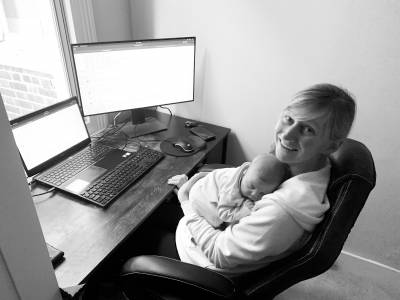
I am a scientist working in cancer research, aiming to increase the precision of proton radiotherapy in order to reduce side effects and improve quality of life for our patients. For my research, I am developing computational models and algorithms to find information about tumour and healthy tissue from CT images of the patient. My everyday work consists mainly of coding algorithms for image analysis, spiked with some experimental work at the CT and treatment machines.
What makes you excited about your job?
I love that I can learn something new every day. This can be diving into a publication about a new development in cancer research, learning a new programming language, or observing new treatment techniques at the UCLH proton centre.
What inspired you to work in this field?
My love for physics and a keen interest in medicine, together with the prospect of doing something meaningful that helps to improve peoples’ lives, inspired me to work in this field and keeps me going every day. It also helps me through difficult times, when my research doesn’t go as planned.
What do you think is the biggest challenge for women in science?
As a new mum, this is an easy question to answer: Climbing the career ladder while raising a child is a huge challenge for every mum in science. Additionally, like so many women in science, I am struggling with imposter syndrome. We need to remind ourselves that we are superheroes and deserve to be confident in ourselves and proud of our achievements!
What has been the highlight of your career so far?
Attending international conferences to present and discuss my work with other experts in the field is my yearly highlight, and my reward for all the hard work throughout the year.
What is the best piece of advice that you have received that has helped you in your career?
Not one piece of advice, but the limitless support of my peers has carried me through difficult times during my PhD and postdoc. My colleagues at UCL have provided countless encouraging coffee breaks and pub nights when research didn’t go as planned. Surrounding oneself with like-minded people and supporting each other makes all the difference!
What advice would you give to young girls thinking about going into science?
Come join us! We need bright and creative women in STEM to make a difference and change the world. Also: Learn to code! It’s a fun and super useful skill that can make your life easier and land you great jobs.
Is there a female scientist who has inspired you?
Yes, two actually! First, Rebecca Nutbrown was group leader at the NPL when I first met her, now head of Medical Physics at the Royal Surrey County Hospital. Rebecca is an incredibly strong woman, a real role model, and an excellent leader.
Second, Magdalena Bazalova-Carter has written one of the first papers I read when I started my PhD journey. Her work has given me the foundation for many projects and ideas throughout my PhD work. She is a real expert in her field who impresses me with her knowledge as well as kindness and sympathy.
- Dr Ester Bonmati Coll, WEISS Senior Research Fellow
- What is your role and describe what a typical day at work looks like?
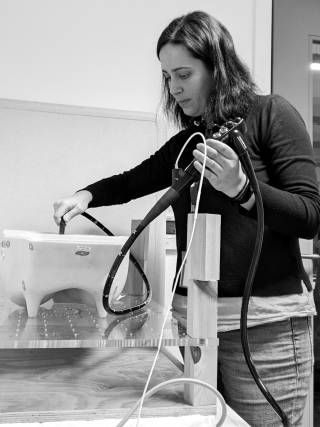
I am a senior research fellow so I spend most of my time doing research. My research is in pancreatic cancer; before the pandemic I would spend many hours a week observing clinicians performing different medical procedures and try to come out with novel ways to help them perform better, faster and safer. Because my research is in medical image computing, I also spend lots of hours developing new computational methods. I also supervise several student research projects, so I regularly meet with them and try to help them be successful with their exciting projects. Recently, I have also spent a substantial amount of time developing new collaborations and applying for funding.
What makes you excited about your job?
I am excited to take new challenges and think how to overcome them. I love to develop new methods with potential to provide a positive patient impact. To develop something that provides patient benefit is very satisfying and rewarding.
What inspired you to work in this field?
I was introduced to medical imaging during my undergrad project, and I have been interested in this field since then. Patients and clinicians are probably the main source of my inspiration, I always learn something new from them.
What do you think is the biggest challenge for women in science?
As a woman, sometimes is easy to feel a lack of self-confidence and it can be hard to get your voice heard. Another, and very different, challenge for me was to go back to work after a maternity-leave. It’s a fast developing field, and returning to work full-time in the middle of a pandemic can be hard because the lack of support.
What has been the highlight of your career so far?
About 2 years ago I obtained a WEISS centre fellowship. I am really enjoying the independence and flexibility to explore new research directions and start new collaborations with engineers, clinicians and patients.
What is the best piece of advice that you have received that has helped you in your career?
My mentor once told me to focus on what I can control, and to relax on what I cannot control. For instance, I can decide if I want to apply for a particular funding or to a new job position, but you cannot control how many people will apply, so you should not worry about the later.
What advice would you give to young girls thinking about going into science?
If science or engineering is what drives and motivates you, then go for it! I would also remind them to believe in themselves, no one knows better than you what you need.
Is there a female scientist who has inspired you?
Yes, many! If I have to choose one, I would say Prof. Julia Schnabel because is someone who I can relate to in many different ways. She has done exceptionally well in the medical imaging field and is a true leader. I wish I could follow in her footsteps!
 Close
Close

